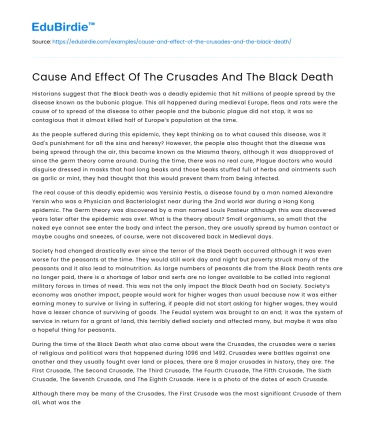Historians suggest that The Black Death was a deadly epidemic that hit millions of people spread by the disease known as the bubonic plague. This all happened during medieval Europe, fleas and rats were the cause of to spread of the disease to other people and the bubonic plague did not stop, it was so contagious that it almost killed half of Europe’s population at the time.
As the people suffered during this epidemic, they kept thinking as to what caused this disease, was it God's punishment for all the sins and heresy? However, the people also thought that the disease was being spread through the air, this became known as the Miasma theory, although it was disapproved of since the germ theory came around. During the time, there was no real cure, Plague doctors who would disguise dressed in masks that had long beaks and those beaks stuffed full of herbs and ointments such as garlic or mint, they had thought that this would prevent them from being infected.
Save your time!
We can take care of your essay
- Proper editing and formatting
- Free revision, title page, and bibliography
- Flexible prices and money-back guarantee
The real cause of this deadly epidemic was Yersinia Pestis, a disease found by a man named Alexandre Yersin who was a Physician and Bacteriologist near during the 2nd world war during a Hong Kong epidemic. The Germ theory was discovered by a man named Louis Pasteur although this was discovered years later after the epidemic was over. What is the theory about? Small organisms, so small that the naked eye cannot see enter the body and infect the person, they are usually spread by human contact or maybe coughs and sneezes, of course, were not discovered back in Medieval days.
Society had changed drastically ever since the terror of the Black Death occurred although it was even worse for the peasants at the time. They would still work day and night but poverty struck many of the peasants and it also lead to malnutrition. As large numbers of peasants die from the Black Death rents are no longer paid, there is a shortage of labor and serfs are no longer available to be called into regional military forces in times of need. This was not the only impact the Black Death had on Society. Society’s economy was another impact, people would work for higher wages than usual because now it was either earning money to survive or living in suffering, if people did not start asking for higher wages, they would have a lesser chance of surviving of goods. The Feudal system was brought to an end; it was the system of service in return for a grant of land, this terribly defied society and affected many, but maybe it was also a hopeful thing for peasants.
During the time of the Black Death what also came about were the Crusades, the crusades were a series of religious and political wars that happened during 1096 and 1492. Crusades were battles against one another and they usually fought over land or places, there are 8 major crusades in history, they are: The First Crusade, The Second Crusade, The Third Crusade, The Fourth Crusade, The Fifth Crusade, The Sixth Crusade, The Seventh Crusade, and The Eighth Crusade. Here is a photo of the dates of each Crusade.
Although there may be many of the Crusades, The First Crusade was the most significant Crusade of them all, what was their goal? When did it take place? The First Crusade took place in a variety of places, including Anatolia, the near east, and the Levant but what was the goal of this battle? It was a battle for the Holy Land and to help Christians of the Byzantine Empire fight back against Seljuk Turks, this Holy Land was taken from the Christian Byzantines by the Muslims in the years 638-641. The pope had made the decision to call for a Crusade, merely to capture important Christian holy sites for instance Jerusalem.
To conclude, The black death was an epidemic that spread vastly across Europe killing millions of civilians not only that but to worsen the situation were Crusades, battles caused by people to gain control of territory or special sites and land from others.






 Stuck on your essay?
Stuck on your essay?

